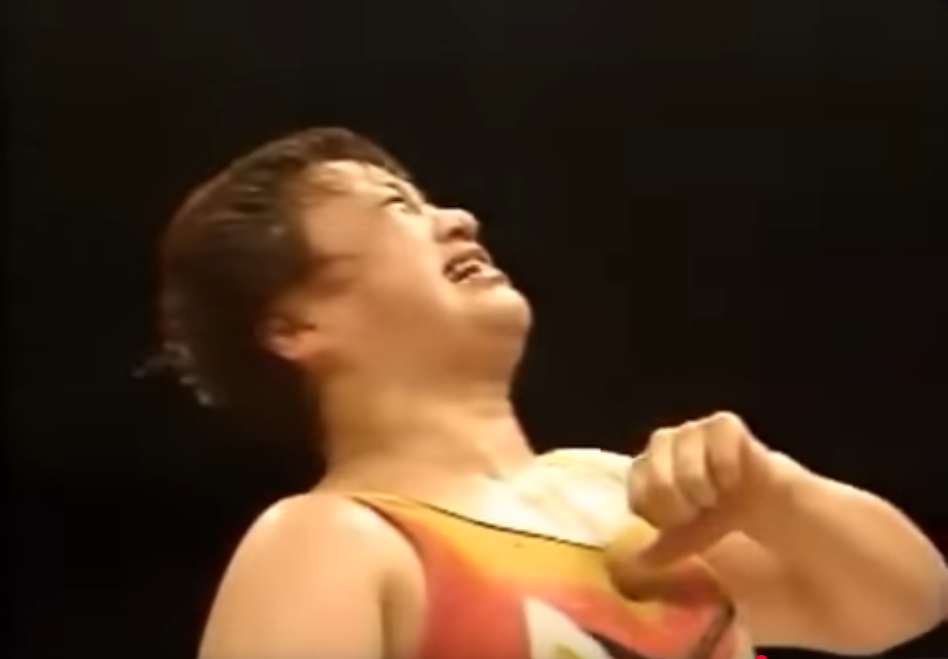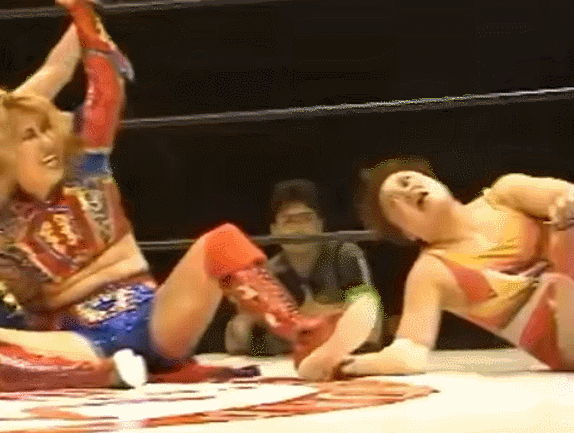In GAEA, Legends are Made.
Meiko Satomura cements herself among the all-time greats against Akira Hokuto.

Sometimes, not always, it happens in a single moment. In this 2001 bout, there's a few moments you can point to when Meiko Satomura cements herself among the all-time greats. For me, it happens before the final bell even signals her victory. It's that moment where Hokuto's down in the ring and before Meiko goes to pick her up, she just points to herself with her thumb. A simple gesture, deeply felt, to signal that she's the goddamn Man now.
It's a stunning visual, one that makes it clear that Meiko Satomura has become inevitable. One almost feels as if the entire history of GAEA up to this point has led her to this moment. In many ways, the story of GAEA is the story of a new generation of joshi workers, best embodied by Meiko Satomura, forcibly taking their place at the top of the heap. And when Meiko puts her thumb to her chest, it feels the realization of that promise that Meiko and her ilk have been chasing since the day that GAEA opened its doors. It's always a little more complicated but what Hoktuo and Satomura achieve here, really does make it feel like the pinnacle of an entire company's run--the thesis that they've been driving at from the very beginning.
So much of that has to do with Meiko's uncanny ability to manipulate the momentum of the match. One sees it here, and one sees it in her matches against Aja Kong most especially, that at varying points of about she can convince the audience of a guaranteed loss or a guaranteed win. The same happens here such as when Hokuto injures her arm early after catching Meiko pinwheeling her arms while coming off the turnbuckles. Or perhaps when Hokuto gets her feet up to catch Meiko coming off the top for a big splash, one might assume Meiko's made one risk too many.
But then the thumb to the chest.
What makes that moment of triumph sing so beautifully too is just how hard fought this whole match is. GAEA is known for its violence, oftentimes characterized by frenzied brawls involving a lot of weapon use and interference. Here, the violence is just a lot more direct and far more visceral for it. It's in the way they're able to channel the scale of the occasion into physicality that's so jaw-dropping.
There's such viciousness in the way these two embody the conflict on hand. To that end, Hokuto's performance here really is quite masterful. Her offense in this is built around the most vicious and (perhaps more importantly) dismissive slaps imaginable. My god, does Hokuto put her whole being into those strikes. They are heart-stopping things, violent enough to strike fear into the hearts of generations.
It's a sink or swim onslaught, and how lovely when Satomura swims.
Satomura's performances before this night are filled with a lot of fire and determination. In this bout though, she backs it up with some truly wondrous firepower of her own. Those leg kicks Meiko throws are crushing. Even better too is how much damage Hokuto accrues on the leg trying to withstand them. Even when she stands to trade with Meiko, those leg kicks never go unfelt. Perhaps most interestingly is that the effect is accumulative. Though Hokuto never sells the leg with the same fervor as her arm, it remains a constant problem for her as she crumples or folds under Meiko's more powerful strikes.
There's also the total urgency that both women put behind every single move in this match. Whether it's the spite they both put behind trying to grab the Stranglehold--Hokuto's inherited submission from husband Kensuke Sasaki--or the scrap they have early on by the turnbuckles which ends in one of Meiko's most satisfying overhead kicks ever. Towards the end of the match too, this urgency manifests as taking any possible opening to get back into the fray. Take the tiniest moment Hokuto takes to celebrate on the mat only to get absolutely blasted in the face with a kick.

Neither woman holds the red belt, but one gets the distinct impression that history itself is at stake here. How could you not? This is Yokohama Arena, the very same venue where Akira Hoktuo wrote her name into the history books in her own blood. Even beyond the large writ legacy of Hoktuo/Kandori at Dream Slam I, Yokohama Arena is hallowed ground in the history of joshi wrestling. GAEA itself reserves only its largest events for Yokohama Arena and it rarely got any bigger than Hokuto/Meiko here.
They fight for history here, and the connections run deep. Much of the match is centered on a dual arm assault from both women. Hokuto's the first to engage in that, snatching a Fujiwara out of the air. It's the same hold that Kandori used to nearly pry off Hokuto's limb early in their Dream Slam I battle and the reversal of Hokuto being the first to apply it this time around speaks to the fact that she's no longer the woman being tested. Hokuto has something to prove once again though. This time, not as some defender of pro wrestling against a judoka from another company, but simply that she's not done yet. This is Yokohama Arena, where she famously bled for her art, and she'll be goddamned if some kid takes the moment from her.
And Meiko does just that.
She weathers the slaps. She endures the attack to both arms. She lands on her head when Hokuto folds her up but she doesn't fucking die. And then she fights for her life, and becomes inevitable. Deep enough into this match, down an arm, equilibrium fading, Hokuto's beat up bad enough that Mayumi Ozaki at ringside launches in on reflex to try and save her at points. Meiko's able to lay in such an ass whooping, the kind that so emphatically shows the difference between "promising" and "here."
Even the finish here rings with the familiarity of all that comes before them. Here in GAEA, the brainchild of Chigusa Nagayo, we see a reflection of the finish from the best women's match ever before this point. In 1985, Chigusa and Devil Masami punched each other out until neither could continue. This time though, Chigusa's own chosen successor, her finest trainee, surpasses the master in so many ways. Hokuto folds, quite literally, into the ring ropes while Meiko stands tall on the GAEA mark.
It's a match with the world on its shoulders. Quite simply one of the greatest of all time.

IS IT BETTER THAN 6/3/94? Kawada falls in a brutal reinforcement of the status quo where as Meiko soars, beyond herself, and beyond the history that came before her. This one isn't particularly close.
Rating: *****
